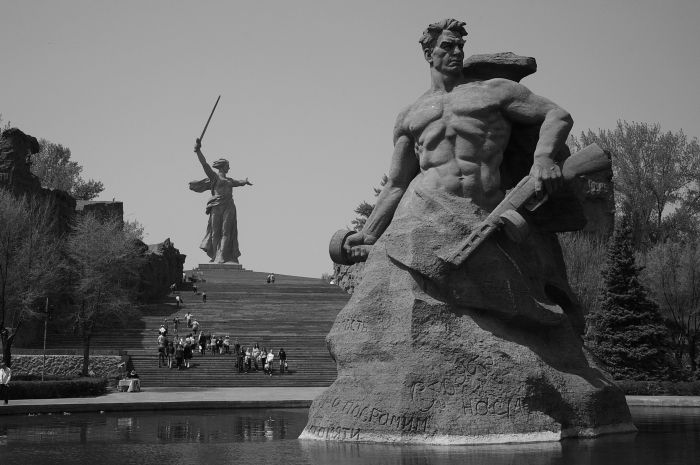|
[In May 2006, Ivo Miesen solo toured a section of the Southern Federal District of Russia between the Ukraine and Georgia and east of the Black Sea.]
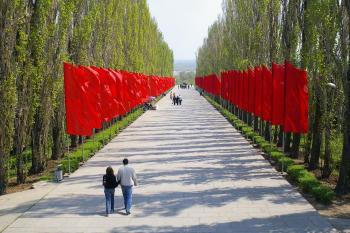
> A report about my trip through Southern Russia during may this year [2006].
> Have a good read!
>
> Ivo
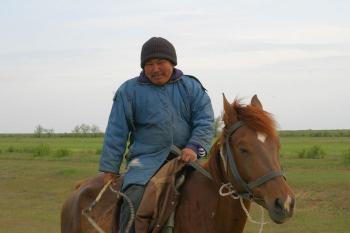
Part I—Volgograd (Волгоград) to Kalmykia (Калмыкия), with Tolik
[→ToC]
Daylight is fading as Tolik and I approach the village of Arshan Zelman. Our
water supplies are low, so we need to replenish them before camping somewhere on
the steppe. A bright yellow Buddhist temple is dominating the entrance of the
village. We stop to admire it. Two young Kalmuks on bikes see us and greet us
friendly. We can fetch water out of the well of one of their houses, but before
we can fill our bottles we are invited for Kalmuk tea, with loads of very fresh
milk.
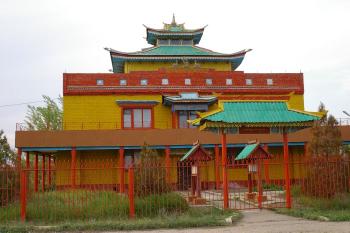
We started out from Tolik's hometown of Volgograd, a city very busy in the
final celebrations of the end of WWII, a war which nearly completely devastated
the city. Since Tolik lives in the northern suburbs of Volgograd we passed the
immense memorial of Mamajev Kugan, a small hill being one of the scenes of
massive fighting during the Battle of Stalingrad. Everywhere in town are war
memorials decorated with fresh flowers. Today it's a bustling industrial city
stretching along the shores of the Volga river for 70km.
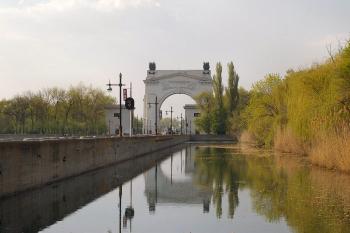
It takes us all afternoon before we reach the Volga-Don channel. Only there we
leave the city and soon enter completely different territory. Only a few dozen
kilometres from the banks of the Volga the scenery drastically changes to
immense steppe with irregular villages living either from the road traffic or
from their pasture lands. Herds of sheep and cows are guarded by mounted
shepherds with dogs.
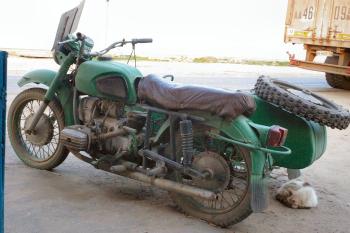
A strong side-wind slows us down and makes the steppe even longer. It's here
that the Kalmuks settled after migrating west from the Asian lands of their
ancestors. They brought their traditions of livestock breeding and Buddhism with
them. And their charming friendliness making the inhospitable steppe a lot
warmer.
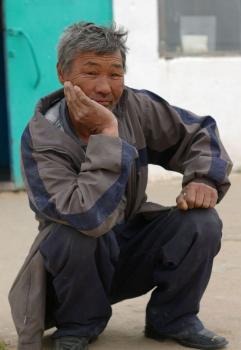
At irregular intervals truck-driver café's form a small oasis of rest from the
wind and especially on our third day from the rain. Only shortly before the
Kalmuk capital of "Jelista" we see more people and signs of farming. We arrive in
the capital while it rains in a dark night. The next morning we take our time
to visit the town. It is a strange combination of drab Soviet-style apartment
blocks and brightly coloured Buddhist shrines and temples. Kalmuk is spoken
everywhere but no one has a problem being addressed in Russian.
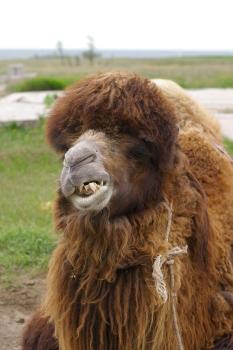
Tolik wants to cross all of Kalmukia before he has to go back to work, so in the
afternoon we continue our ride. In a village south of Jelista we are stopped by
a police control. As usual, they ask for our documents and are quite dumbfounded
seeing my Dutch passport. A few hours later I have to pull it out again, this
time at the border demarcating the end of the Kalmukian pasture lands and the
start of Russian farming. Tolik takes the night-bus to Volgograd from the first
village in the Stavropol Kraj while I find a bed in the dormitory opposite to
the station.
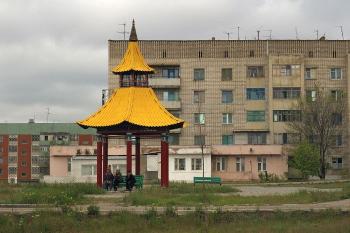
Part II—Stavropol Krai (Ставропольский край)
[→ToC]
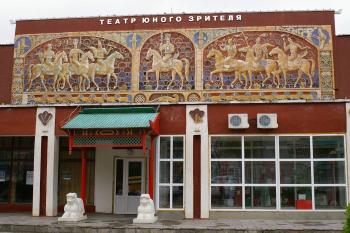
The TV in the dormitory is showing the usual sort of film at the start of
May—displaying the fearless Soviet soldiers fighting during WWII.
The next day is a day of celebration, Victory Day.
For me it's another cycling day, a cycling day
with occasional rain-showers. During one of these rain-showers I stop at a
village restaurant to drink some tea. This time a more luxury restaurant, not
the usual truck stop. Shortly after I've ordered my tea, two army officers
enter, both of them in varying degrees of drunkenness. When they hear that I'm
a foreigner they immediately take interest in me. First they try to persuade me
to drink with them, then one of them starts the usual heavy handedness applied
by Russian officers to common soldiers. Luckily I manage to stay calm.
I finish my tea and, with the assistance of the barmaids, manage to retreat to my
bike and the road. I decide to stick to truck-stops for the next days.
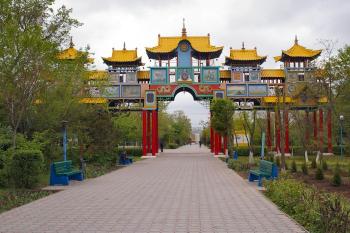
In Svetlograd I once again experience that many new roads are constructed in
Russia. The one which, according to the map, is a small and quiet valley road, now
in reality is a ring-road around the town of Svetlograd. Just after the town a
new rain-shower starts. I decide to cycle on and search for a hotel somewhere
along the road. In a village I ask around. There should be a small hotel in the
next village, Gofitskoje. Through a wet and dark evening I plod on, passing a
few nice camping spots. But, in the next village there isn't a hotel. The staff
of a roadside café let's me sleep there though, to keep the night watchman
company. I roll out my mat and sleeping bag onto the floor. During the night I
have to retreat to higher ground—the roof is leaking due to a violent
rainstorm.
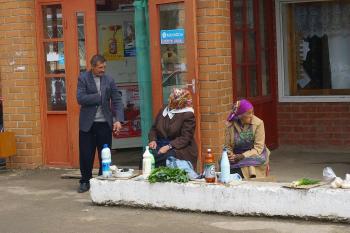
The morning shows another picture—within an hour after the start I'm in shorts
and short-sleeves again. The main road goes via Stavropol, but I take a short
cut via minor roads. Only mountain villages along the road and great spots to
eat. Aleksandrovskoye is the only small town I pass. After Aleksandrovskoye
there are no supplies for the next 50km. The road leads straight as an arrow to
Mineralnij Vody. It's a constant up and down, really wearing me down.
Kilometres away from the main-road are the villages. Camping spots enough, but
water is the problem. I have to decide between a detour to fetch water or
plodding on to Min. Vody. I decide for the latter option. and find lodging in
Hotel Kavkaz.
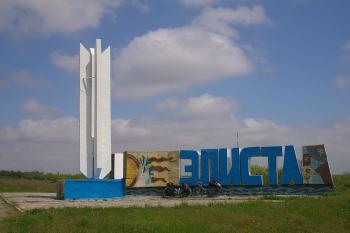
I'm only 25km north of Pjatigorsk, a short ride before I meet my
old friend Roman. He meets me at the outskirts of town where my luggage is
transferred into the car of one of his friends. After running some errands, he
shows me the town by bike. Pjatigors is an old spa with many old buildings
dating back to the Tsarist empire. And many springs, one of them being a lake
inside a mountain. But the best, Roman saves for the last. He is one of the
pilots at the local paragliding base. So, in the early evening we cycle to a
mountain near the town, to the paragliding base. Here, among great scenery I
find the typical atmosphere of Russian outdoorsmen.
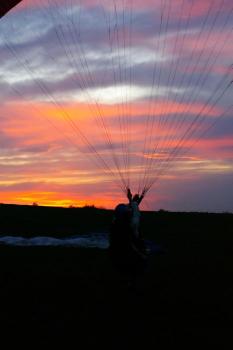
Part III—Pyatigorsk (Пятигорск—"five mountains"),
with Roman
[→ToC]
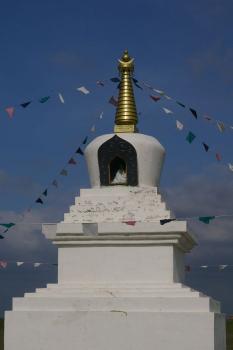
The next morning, Roman invites me for a tandem-flight. Loaded with paragliding
kit we scramble up the mountain. On the top several paragliders are collected,
all with rather pensive expressions. An elderly man is holding up a wind-speed
meter. The wind is a bit on the strong side and very unpredictable. Quite
quickly it's clear that only the experienced solo pilots can fly, no chance for
large tandem parasails under these conditions. I go down again and restrict
myself to photographing the flights of the experienced pilots.
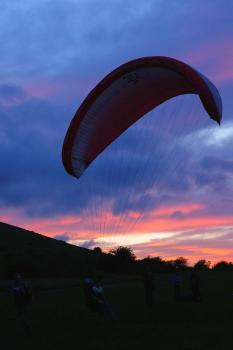
After replacing a stuck gear-cable, I set of for the real mountains of Northern
Cuacasia. Already, in Pjatigorsk, I noticed an enormous police presence. But on
the Pjatigorsk-Kislovodsk road the police presence was huge. Every few hundred
meters a policeman was standing, in eye-contact with his colleague along the
road. Now and then a police car followed by some 4WD's would speed past. Just
before the outskirts of Kislovodosk, all traffic is stopped. An enormous convoy
of police cars, 4WD's and luxury cars races to Pjatigorsk. After this convoy
passed, all traffic resumes.
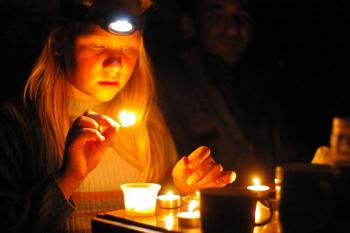
Just after the border with Karachay-Cherkess Republic, I stop to ask for some water.
My plan is to find a place to camp just after a set of villages. My request of
water is answered with an invitation for tea—an invitation I gladly accept. But
it doesn't end with tea, a whole meal appears on the table. The neighbor's
daughter, who speaks good English, is invited too. No chance to leave before the
night. A long evening of food, tea and conversation follows, only interrupted by
a visit to the neighbor's banja. A perfect display of Caucasian hospitality. But
they tell me long tales of the other side of the Caucasus, of assassinations
and of the risks of the Caucasus after dark.
The next day I experience the danger myself.
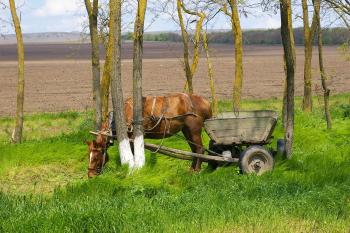
Part IV—Karachay-Cherkessia (Карачаево-Черкесии)
[→ToC]
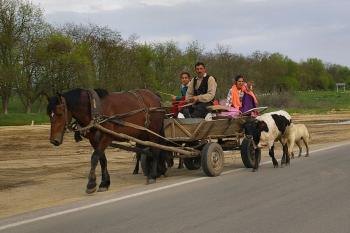
In the last village before the Gumbashi Pass, I restocked with supplies. At
2030m Gumbashi Pass is one of the highest road passes in Russia. Most
traffic takes a detour via a lower road, so after the village, traffic was
scarce. A few km down the road two men sitting on a concrete block addressed
me. They posed the usual friendly questions. They asked me to come behind
the blocks due to the traffic. Immediately behind the blocks I didn't feel
that comfortable.
I was right in my feelings, they started to ask for money
when they sensed my changed attitude. 2000 rubles they wished (about. 60 Euro)
and threatened to beat me. I was not very eager to part with this sum, so I
tried to get out of the situation. Luckily I was only 50m from the road.
When one of the men started to threaten slashing my tires with his knife I
started to pull some money out, very slowly, 10 ruble bill by 10 ruble
bill. Just when I ran out of 10 ruble bills the two men started to get a bit
nervous since they heard a car coming. They tried to pull me and my bike
behind the bushes, luckily it's not that easy to drag a loaded touring bike
for the uninitiated. Everyone fell to the ground and I was the first to be
on my feet again, running to the road. The car had already passed, so I drew
my mobile, but alas, no signal. But still they could see me with my mobile
phone. A 100m down the road a shepherd was visible. I ran to him and
explained that I needed help. Just as I was talking to him the two men
appeared 300m down the road, running. The shepherd immediately gave chase
while I searched for my bike. The bike was okay, only some mud on the
panniers. Not a single item was missing.
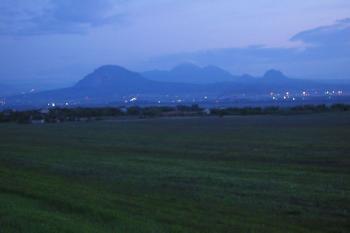
When I returned with my bike to the
road I saw the two men running very fast towards the village. The shepherd
was quietly going up again. I thanked him and he told me that the men were
afraid of his nervous horse. Anyway, two not so experienced robbers don't
have a chance against a mounted shepherd with a dog. I thanked him again and
resumed my ride up the mountain pass. I was glad that all ended in my
advantage. They were the ones who received the biggest shock. And I was
strengthened in my opinion that staying calm and non-violent is mostly the
best option in such a situation.
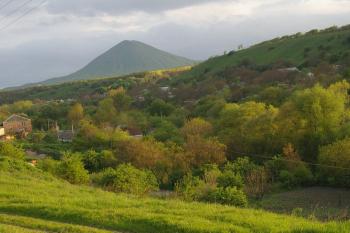
Shortly before the top of the pass I entered the clouds, a pity since from
the top, on a clear day, mount Elbrus is visible. On the descent, I suffered
the only puncture of this trip. Apart from that, the descent was great,
without major difficulties. Still occasional cows on the road called for
attention. At the entrance Karachajevsk there was the usual police control.
I told the officers that I had an incident with two bandits down the road. I
couldn't give a proper description of the man, so no use of filing an
official report. Jokingly one of them offered me to sell his gun.
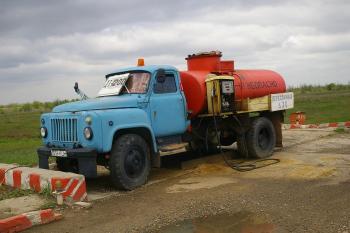
I didn't feel that safe in Karachajevsk. Too many men standing around
looking for a cheap and fast ruble. At the bus-station there were only small
GAZelle buses. Since it's a dead-end road to Dombay, I'd decided to take a
bus up. Prices quoted were insane, 500 ruble for the 40km trip on a
marshrutka. So I set out by bike. Not long after I left Karachajevsk the
same marshrutka overtook me and stopped. Now the price dropped to a more
acceptable 100 ruble. I agreed. The driver dropped me of in Teberda.
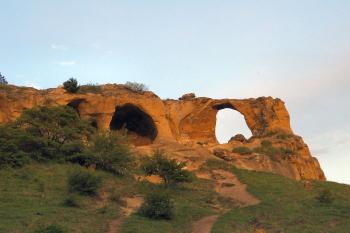
From Teberda on, cars and buses have to pay a special tariff to enter the national
park. Cyclists are only registered and don't have to pay, except with their
sweat. So the final bit to Dombay I cycled again. The rain had stopped and
between the clouds wonderful panoramas were visible. Dombay has a wide
range of accommodations. I settled for the dorm room of the mountain rescue
team. Sadly, no other guests, so I had to spend the night on my own.
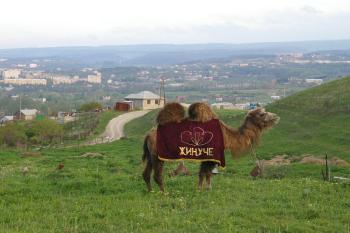
Part V—Dombai (Домбай) to Cherkessk (Черкесск)
[→ToC]
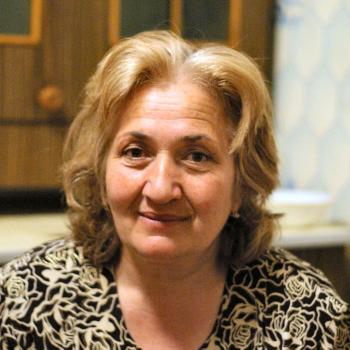
Quite some time ago I wrote a 4 parts of my trip report through Southern
Russia. Due to time constraints I had to stop writing the last parts. But now
I pick it up where I left you, in the alpine village of Dombay where I found
a lodging at the local rescue brigade.
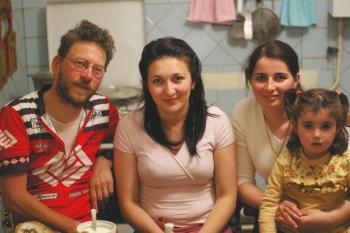
The evening in Dombay was quite leisurely. Hardly any tourists in town, after
all it was too late for the skiing season and too early for the hiking season.
So, a perfect time for the mountain guides to throw a party. I retreated to a
local café to find an excellent dinner. In the morning, when the guides slowly
started to appear, I discussed with them which hikes were possible for me with
my skiddy sports shoes. Only through the valley of the Alibek river was their
conclusion, most valleys were off-limits now due to avalanche risks. So I spent
a nice morning strolling through a rainy valley. When the rain ceased, I went
back to the village and the cable-car station. Going up to 2400m was a lot
easier by cable-car and ski-lift as by bike ;) Lot's of snow still at 2400m, and
still many skiers. With my skiddy shoes it was not a pleasure up there, my
MTB-shoes would have been better.
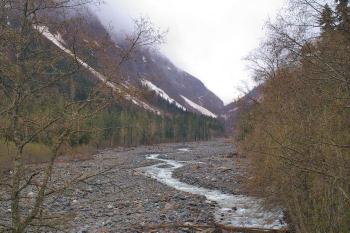
While waiting for the return cable-car I talk a bit with some locals. Down in
the village I meet them again. They ask me to join them in a small excursion
to a little swamp somewhere down the road. Despite the bad weather it's a well
spent rest day.
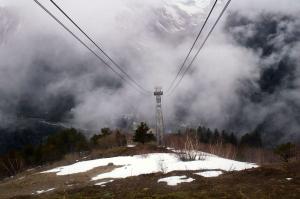
The next day was half a rest day. I had about 1500m altitude to loose. So
enough time to concentrate on safety issues. While passing Karachajevsk I got
the same bad vibes as two days earlier, something told me that it was not
that safe there. So I decided to evade further trouble and move more down, to
the main road. Originally I planned to go via some back roads through the
villages. Not this time, that's something I'll do another time when I'm not
traveling alone. Only a few kilometres after I decided to change my plans, a
car stopped. It was one of the mountain guides on his road to Cherkessk. I
told him that I changed my plans. He completely agreed with me, the mountain
road through the villages is only safe when you're in a group.
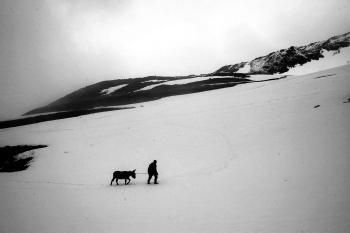
Completely
against my habits I arrived in Cherkessk in broad daylight. Luckily my
region map also had a map of downtown Cherkessk, including hotels. First try
was the hotel near the stadium, but that was under reconstruction. But as
usual in Russia, sportsmen help sportsmen. A local football-trainer gave me
excellent directions to another hotel—Hotel Cherkessk. A typical hotel of the
old intourist type. A bit decayed, but friendly priced. The receptionist was
quite astonished when I presented her my Dutch passport. Apparently foreigners
hardly reside here.
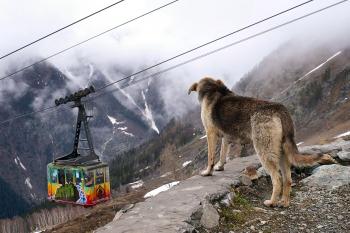
Part VI—Adygeya Republic (Адыгэ Республик)
[→ToC]
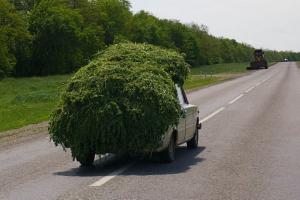
While spending the evening in Cherkessk, I start to think about the Caucasus.
It strikes me again that all the youngsters on the street in Cherkessk walk
together—boys with boys, girls with girls. They are eying each other, but
hardly talking. The only mixed groups are the Russians. Clearly the male and
female worlds are very separated. On the other hand, I hardly see any signs of
heavy Islam, less than in an average western European town. So it must be the
old patriarchal Caucasus culture which defines the specificity of the Caucasus.
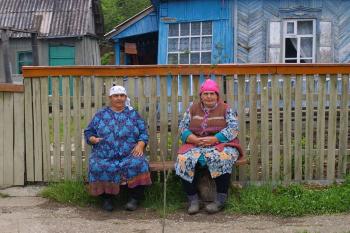
The next day I race out of the Karachay-Cherkess Republic—not that I'm afraid
anymore, but for the first time during this trip I have a good tailwind. I
easily arrive at the Baku-Rostov main road. Finally some fine tarmac with
excellent services. I profit from that with a nice lunch in a roadside café.
Three policemen enter when I'm having lunch. Behind their heavy arms
(Kalashnikov assault rifles) they are very friendly.
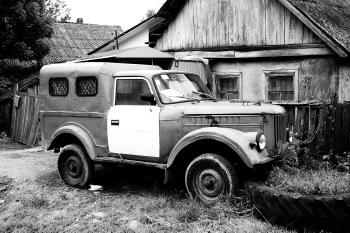
Again I arrive at my destination with lots of time in hand. At the side road
to Armvirsk, I see a small hotel. But this time the receptionist quotes a
completely different price as mentioned on her desk. I don't like the policy of
foreigner prices, so they loose a customer. On the map a turbaza is mentioned
in Armvirsk. I have to ask a few times before I find the right trail to the
turbaza. But it's not a real turbaza, it's a otdechat baza, a leisure centre of
a factory. The reception is completely different from the reception at the
small hotel. After a friendly chat with the guard, I'm assigned a cabin. When
he hears that I'm a humble postman, he doesn't even charge me for the night.
The huge network of turbazas and other holiday camps is an asset for Russian
tourism which could be used in a far better way. There are not many customers
in the off-season: only four—all relatives. The two guys are already quite
drunk. Both of them served a few contracts in Chechenya. That's clearly
visible. They are quite rude and heavy handed, also towards each others. The
girls keep them in check though, in contrast with the Caucasus mores. So it's
still a pleasant evening.
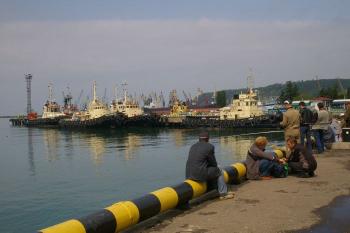
The next autonomous republic—the Adyegya Republic—is already different. It's
a Muslim republic but next to the mosques the old Soviet influences are very
well visible. Again I see villages with names like '20 year octobe'. Also
street-names are of the common kind. And no classic Caucasus habits anymore.
When I have my evening stroll through the streets of the capital Majkop I see
young couples everywhere. But the old taxi-driver who drives me to back after
the evening stroll greets me in the Arab fashion. A friendly reply of the
right kind, «Aleikum Asalam», breaks the ice. Even the fare is of the regular
kind. Before sleeping, I have a chat with some sportsmen who stay in the
Turkompleks where I stay too. It's specially geared for sportsmen, so plenty of
like-minded guests.
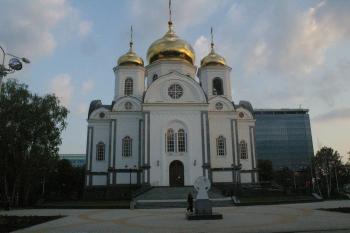
The final day is a day with two different sides. The first part is
relentlessly rolling. The map is correct here, an enormous amount of altitude
lines, all around 500m. This wears me down a lot more as the final part of the
day—the small road to the coastal town of Tuapse. Here I have to scale a few
passes. But these passes, even the unpaved one, are a lot easier as the
relentlessly rolling highlands. On top of the highest one, the Shaumansky
Pereval, I talk a while with a family running a small restaurant. Their small
daughter, nicknamed "hooligan", is racing around on her tricycle. Sadly, I don't
have the time to eat here, evening is nearing as does a light rain-shower. I
race down the mountain, despite the unpaved road. Heavy Kamaz trucks are no
match to me.
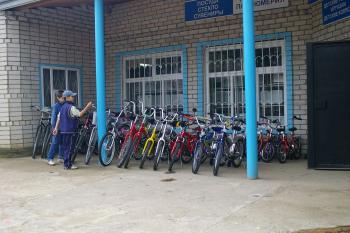
For the first time during the trip I have some serious problems finding
affordable lodging. All the mentioned hotels only have expensive rooms left
over. The only budget option, Hotel Tuapse, is another problem—this hotel is
owned by the MVD (Ministry of Internal Affairs), and the receptionist doesn't accept foreigners. So I have to
settle for a way too luxury room—Not a fitting end for this trip. Before
boarding a bus to Krasno
I walk around town and catch a
glimpse of the Black Sea.
—Ivo Miesen
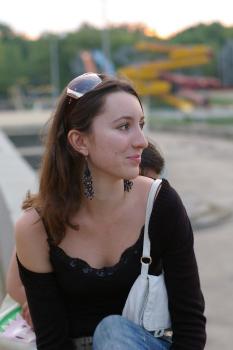
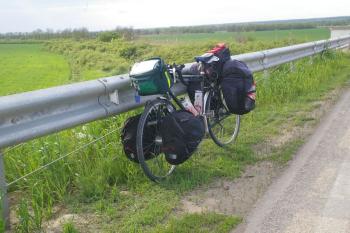
May 2006
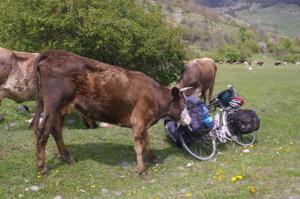 More photos
More photos
[→ToC]
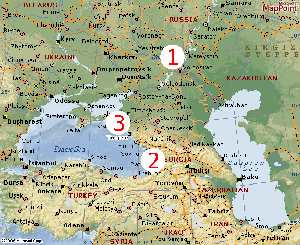
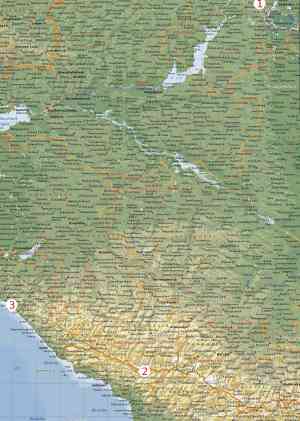
[→ToC]
- GAZelle buses:
- GAZ is the main Russian firm for cars, minibuses and trucks. Gazelle is their
brand name for minibuses.
[Wikipedia]
- Marshrutka:
- Like turkish dolmus. Itinary mini-bus/taxi taking passengers fast and at a bit
higher price as a bus.
[Wikipedia]
- Kamaz trucks:
- Kamaz is another brand of Russian trucks.
[Wikipedia]
- Turbaza:
-
The Russian Turbaza (Турбаза) focuses on offering cheap accommodation for holidays,
yet it has a completely different orientation than a hostel—more like the large campsites at European holiday destinations than a hostel, the Turbaza
makes no attempt at encouraging cultural exchange, nor is it youth-oriented in the manner of a hostel.
Most Turbaza are used by groups renting the whole place.
Sometimes they are mainly catering to workers from a certain firm.
Another explanation:
VisaExpress.net writes:
A turbaza (tourbase) is a holiday camp for Russians, usually owned by a factory or large company for the use of its employees. They're often spartan and lodging options are usually a large common room with six or more beds, smaller doubles and private cottages. All are cheap - from as little as R300 per person - and there are reasons for this: many turbaza have no indoor plumbing, with the stolovaya (canteen) the only place to eat. But if you bring a good supply of food and a sense of adventure, turbazv are a great way to get a feel for the average Russian's holiday. At some, you can arrange boating, skiing, hiking or mountaineering.
Another explanation:
Aaron Erlich blogs:
Turbaza/Турбаза
Roughly halfway in between Tver and Klin the Volga River meets the Shosha river, and it is there that I spent the last couple of days relaxing in one of European Russia’s most beautiful sposts. I stayed in what is called a turbaza, a relic of the Soviet past that is very quickly dying out. In fact, my rich friend was at first shocked that I knew the word. He was even more shocked when I told him that they still existed.
I didn’t actually do much at the turbaza. My attempt to learn the favorite Russian pastime of mushroom picking was thwarted by the lack of mushrooms; my Russian friends and I only managed to find a small number of the poisonous kind. However, I gained a healthy respect for the rural skills Muscovites still retain. One of my friends, an elegant language student, seemed to leap at the opportunity to catch newts in her hand and thought nothing of poking around anthills. Both of my friends could easily identify at least 15 varieties of mushrooms though they had lived their whole lives in the city.
The clientele at the turbaza were mainly manual laborers and were staying at the turbaza to fish. The place was full of nostalgia. The men wore the large Soviet plastic frame glasses and the women donned shapeless flower print dresses no longer in vogue in Moscow. The summer-camp atmosphere made me appreciate the best in the socialist ideology. The turbaza is simple, pleasurable relaxation that everyone, no matter their wealth, can enjoy.
Almost everyone seemed to know each other, and the atmosphere was pleasant. Though the beds were olds and soft, the cabins were clean and rustically cozy and pleasant to look at like unlike the pre-fab housing in Moscow. The food was also simple Russian fare. Everyone ate together in a camp-style dining hall, and the lights were turned out after half and hour, so there was now lingering.
This type of vacation as been replaced for the capitalist all-inclusive Turkish holiday. 500 dollars for a week at a five star hotel just isn’t the same, and I hope that at least a few these turbaza remain open. If they could just improve the toilets at the turbaze a little bit, I think they could eventually thrive.
Posted by Aaron at August 20, 2004 03:32 PM
[→ToC]

|
